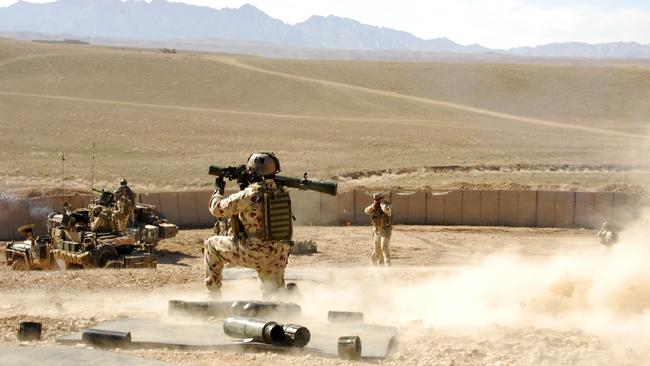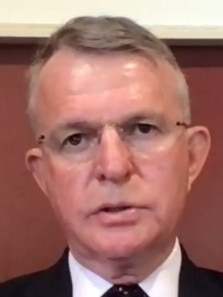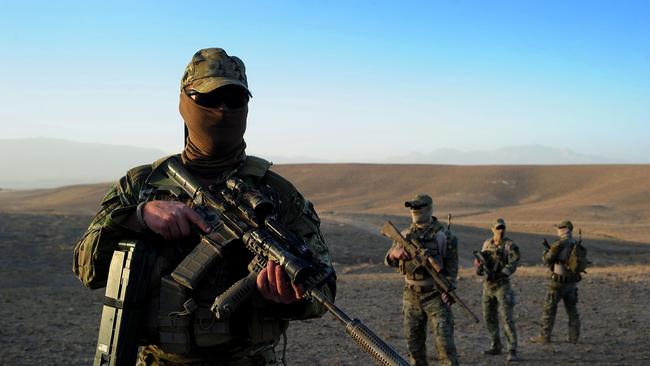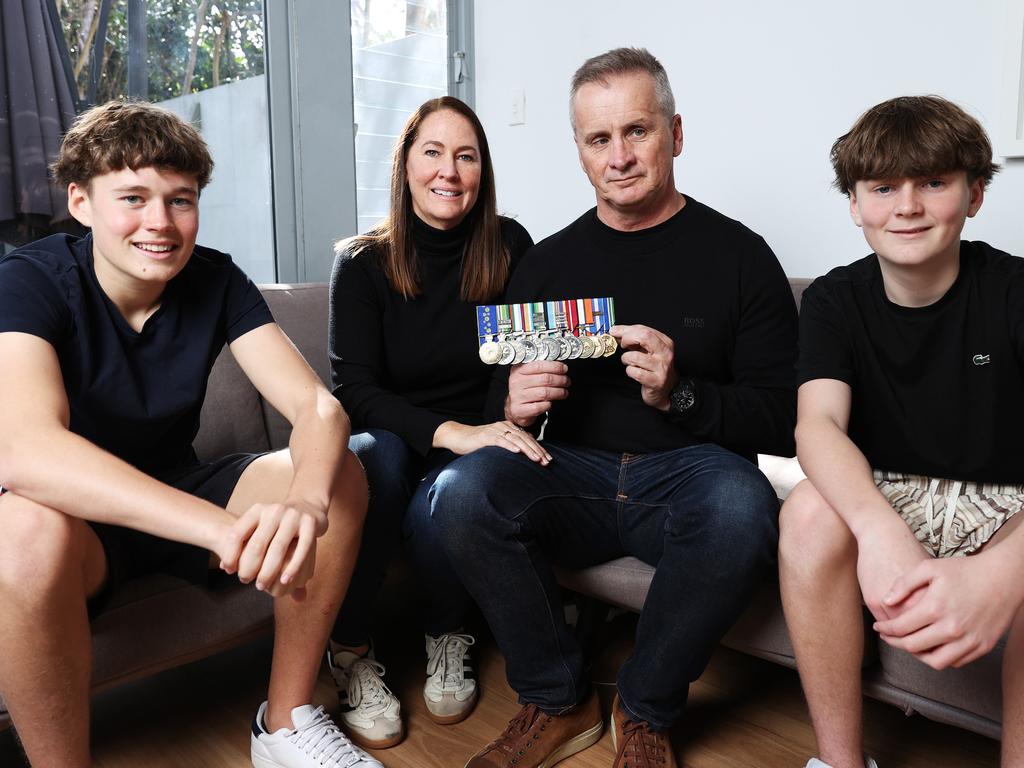Defence ‘ignored toll of exposure to explosions’
Defence and Veterans’ Affairs ignored mounting evidence of chronic brain injuries in soldiers caused by repeated exposure to blast pressure waves.

Defence and Veterans’ Affairs ignored mounting evidence of chronic brain injuries in soldiers caused by repeated exposure to blast pressure waves, abandoning testing and de-funding research that could have eased a suicide epidemic.
The condition, similar to concussion-related diseases in footballers, has been attributed by researchers to the cumulative effects of mild traumatic brain injuries, or mTBI, from explosions in training and combat.
Researchers warn it is prevalent among special forces personnel, and is also considered a major health risk for tank and artillery crews, infantry soldiers, engineers and navy clearance divers. It is linked to depression, PTSD and suicide, but is difficult to conclusively test for until after a person’s death.
The US is moving to protect soldiers from mTBI, or so-called blast overpressure injuries, investing more than $1bn in research and legislating new measures to monitor troops’ exposure and test for signs of injury.
But the Australian government only last month resumed monitoring soldiers’ blast exposure in a small pilot project, after a 2012 study on soldiers in Afghanistan codenamed Project Cerebro was axed amid alarming early results.
Funding was also slashed for a major research project that was examining brain injury and PTSD in 500 Afghanistan veterans, which would have provided the departments of Defence and Veterans’ Affairs with vital evidence that could have been used to protect soldiers from harm.
One of Australia’s foremost experts on military brain injuries, Adelaide University professor Alexander McFarlane, said the “invisible wounds” suffered by soldiers were not unique to modern combat, with the term “shell shock” coined in World War I to describe psychological injuries from explosive blasts.
He said mTBI-related harm to soldiers had gained more attention in recent times amid growing awareness over the degenerative brain disease CTE among players of contact sports.

Professor McFarlane was the lead researcher on the 2010 ADF Mental Health Prevalence and Wellbeing Study, which found 9.3 per cent of soldiers who were deployed to Afghanistan reported mTBI symptoms. But he said funding for the project was cut, preventing full analysis of the results and further testing.
“There was little interest in the findings from this study of Afghanistan veterans by the ADF or DVA,” he said.
“The planned follow-up and retesting of these veterans was never fully undertaken due to lack of adequate funding.
“There was no consideration of how these findings could be used to assess the impact of blast exposure or other head injuries using available methods of measuring brain function.”
Professor McFarlane said the US’s Blast Overpressure Safety Act currently before Congress should be a wake-up call for Australia. The act would require troops to wear blast-pressure monitors, undergo regular neurocognitive testing, and ensure medical personnel were trained to recognise blast-exposure injuries.
“There needs to be a co-ordinated research and clinical program investigating mTBI as part of a broader program optimising the health of ADF veterans,” Professor McFarlane said.
The ADF sought to measure the effects of blast exposure on troops using helmet-mounted sensors as part of Project Cerebro, but there is no evidence the data was used to inform any changes in training or operational procedures. One soldier involved in the 2012 study said all those who participated had their blast gauges “red line” when using shoulder-fired anti-tank weapons, hand grenades and explosive entry charges.
“There was nothing you could do about it,” he said.

In June, Defence embarked on another monitoring project to assess blast overpressure exposure for an unknown number of personnel, who will also undergo cognitive testing. The results of the 18-month project will inform further research.
The Minister for Veterans’ Affairs and Defence Personnel, Matt Keogh, said the health of serving and former personnel was a top priority. “ Since this issue was first raised with me last year, I have engaged with senior Defence officials, including the surgeon-general, about what the ADF’s experience to date has been, and the research and monitoring that they are now undertaking to better understand repeated blast brain injury,” Mr Keogh said. “Defence is also undertaking preventative action to support the ongoing health of ADF personnel.”
Veterans group Vigil Australia, which is running a community campaign on blast-overpressure injuries, disputed the government’s commitment to addressing the condition.
The group’s convener, Paul Scanlan, who attended a Blast and Conflict Injury Conference in London, said he was astounded to find he was the only Australian representative there.
“There was no one from the Department of Defence, the Australian Defence Force, Defence Science and Technology group, DVA or the Department of Health and Ageing,” the retired special forces officer said. “When I speak with international experts, they have had no contacts with our Defence bureaucracy. We are 10 to 20 years behind the US in dealing with this problem.”
The Royal Commission into Defence and Veteran Suicide made no mention of the dangers posed by mTBI in its interim report, reflecting the failure of Australian authorities to take the condition seriously. But it’s understood its final report will recommend further research be undertaken to inform the government of the risks.
Part of the problem, advocates say, is the failure of the Australian Institute of Health and Welfare, which analyses ADF and veterans’ suicide data, to examine the links between specific military occupations and suicide risk.
As research from the US has shown, some military specialties are more at risk from mTBI. A recent Harvard study on 30 career special forces soldiers, for example, found a clear association between blast exposure, altered brain structure and impaired cognitive performance.
Labor MP Luke Gosling, a former 1st Commando Regiment officer, has thrown his support behind the Vigil Australia campaign, calling for the royal commission to provide “meaningful recommendations” on the condition.
“There will be benefits from screening and collaboration for mTBI and blast overpressure, not only for our ADF personnel but for veteran wellbeing too, improving the health and safety of our people,” Mr Gosling said.
Noting that the US was “well advanced” in screening for mTBI in its armed forces, Mr Gosling said there could be a role for AUKUS’s so-called Pillar II technology partnership in fostering joint research.
Opposition defence spokesman Andrew Hastie called for greater investment to protect soldiers from risking life-altering brain damage as a result of their work.
“Not surprisingly, we are seeing this in allied special operations communities, who carried the heaviest burden of fighting in Afghanistan,” Mr Hastie said.
“We need to look closely at blast-overpressure injury, and make sure our troops have preventative measures in place so we can have them serving longer, and have them retiring in a good state of health.”
*If you or a family member need help, contact: Suicide Call Back Service 1300 659 467; Lifeline Australia 13 11 14; Open Arms 1800 011 046; Defence All-hours Support Line 1800 628 036





To join the conversation, please log in. Don't have an account? Register
Join the conversation, you are commenting as Logout